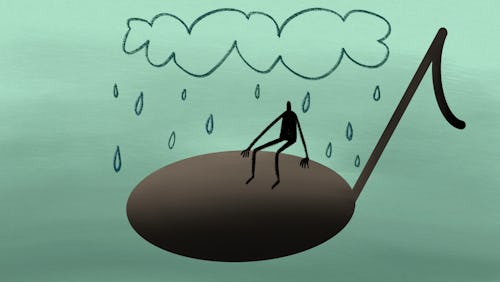
When I'm sad, I listen to sad music. When I'm happy, I listen to happy music. When I'm depressed, I don't listen to any music at all. This is such a reliable pattern in my life that I can use my playlist usage as a barometer for my mental health — when I'm really struggling, no music will bring me joy.
Given the fact that listening to music has been clinically shown to improve your mood, this feels profoundly unfair. Not to be dramatic (okay, a little dramatic) but why am I being punished by my own brain?
There are hundreds of thousands of posts on social media made by depressed people asking why they can’t stand listening to music. Most experts seem to agree that losing interest in music is common in people experiencing depression not actually because of music itself in particular, but because depression causes people to lose the ability to feel pleasure in general.
“Depression can present as a general ‘flattening’ of interest in life,” explains John O’Brien, a psychologist in Maine and professor of psychology at the University of Maine, tells me. “I describe it to people as the difference between watching a show in color versus black and white; while you can still see what's happening, your experience is significantly dulled,” says O’Brien. It is common for people with depression to lose interest in anything that they usually find pleasurable, he explains.
And while science hasn’t really figured out why music brings us pleasure, recent research has used positron emission tomography (PET) scans and MRIs to observe what happens in our brains when we listen to music. The results are pretty amazing. When humans listen to music, the brain begins producing dopamine — a chemical that gives us feelings of wellbeing and pleasure — and that dopamine positively impacts the parts of the brain that are associated with emotion, learning, memory and decision making. Basically, music helps our brain make happy chemicals that affect how we feel, make choices, learn, and even how and what we remember.
The problem is that people with depression are often dopamine deficient, and people who have major depressive disorders have high rates of dopamine dysregulation. Basically, depression interferes with the body’s ability to produce and distribute dopamine, which can result in feeling a loss of pleasure and motivation. So it’s not that people with depression hate music, it’s that when they listen to music, their brains may not respond with the pleasure rewards usually associated with listening to music.
Music helps our brain make happy chemicals that affect how we feel, make choices, learn, and even how and what we remember.
It’s important to note that many people on the internet seem to be self-diagnosing themselves with musical anhedonia or amusia, which are both conditions that impact an individual’s ability to enjoy music. But all of the experts I spoke with for this piece were emphatic that it’s important not to conflate the loss of interest in music that may be a symptom of depression with these other — very specific — conditions. Recent studies suggest that musical anhedonia is caused by structural differences in the brain and amusia is a hemisphere disorder in the brain, O’Brien explains.
There are some things that people with depression who want to regain their love of music can do, but before you totally DIY your mental health trip, please remember that depression is a serious illness that can be treated. “If an individual shows no signs of progress, a psychological intervention would be beneficial,” says Lea McMahon, a psychotherapist in Houston who specializes in neuropsychiatry and addiction treatment. Basically, if you try to get your groove back and it just isn’t happening, it could be time to seek professional mental health help.

If you are already being treated for depression and want to work on getting your love of music back outside a doctor’s office, the first thing you need to know is that you cannot force the process. Forcing yourself to listen to music and enjoy it the way you used to may not be the best thing to do as it can bring out negative feelings. “Listening to music during the depression phase can make the whole process repulsive,” says McMahon. It's better to take an easy-going approach and give yourself some breathing space.
You can, however, try integrating music back into your life in more gentle ways. “Listening to Lo-Fi music is the best bet,” says McMahon. McMahon and O’Brien agree that it’s crucial to avoid anything with lyrics at first. “Start with music that has the potential to be soothing and see if you can grow it from there,” says O’Brien.
Alison Hughey, a music therapist in South Carolina who works with people with depression, agrees that lo-fi and ambient music without lyrics is great for getting back to music. “Listening to soft background music or instrumental music is an excellent way to enjoy music when your normal music is ‘too much,’” says Hughey. “Your body and mind can enjoy the health benefits of music without your brain working to make sense of the lyrics.”
It also may be helpful to pair background music with something you already do everyday. “Try making a daily practice of music listening and pair it with a daily task, such as brushing your teeth,” says Hughey. McMahon agrees and adds that you can also reintegrate music by listening when you’re doing something that you already enjoy or that is proven to improve emotional regulation, like exercise. “Go out for a jog or start doing lightweight workouts that can aid in boosting mood and require music to complete,” says McMahon
The number one thing every expert agrees on when it comes to the connection between music and mood is that if you aren’t feeling it, you need to go easy on yourself. “The connection between music and depression is uncanny and raw,” says McMahon. “Music is often used as a gauge to assume mood and express feelings that words cannot fathom.” If you’re already feeling depressed and kind of fathomless, it’s okay to skip the Lizzo and move quietly towards things that make you feel better.







